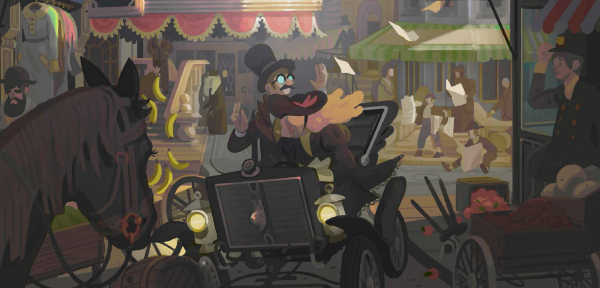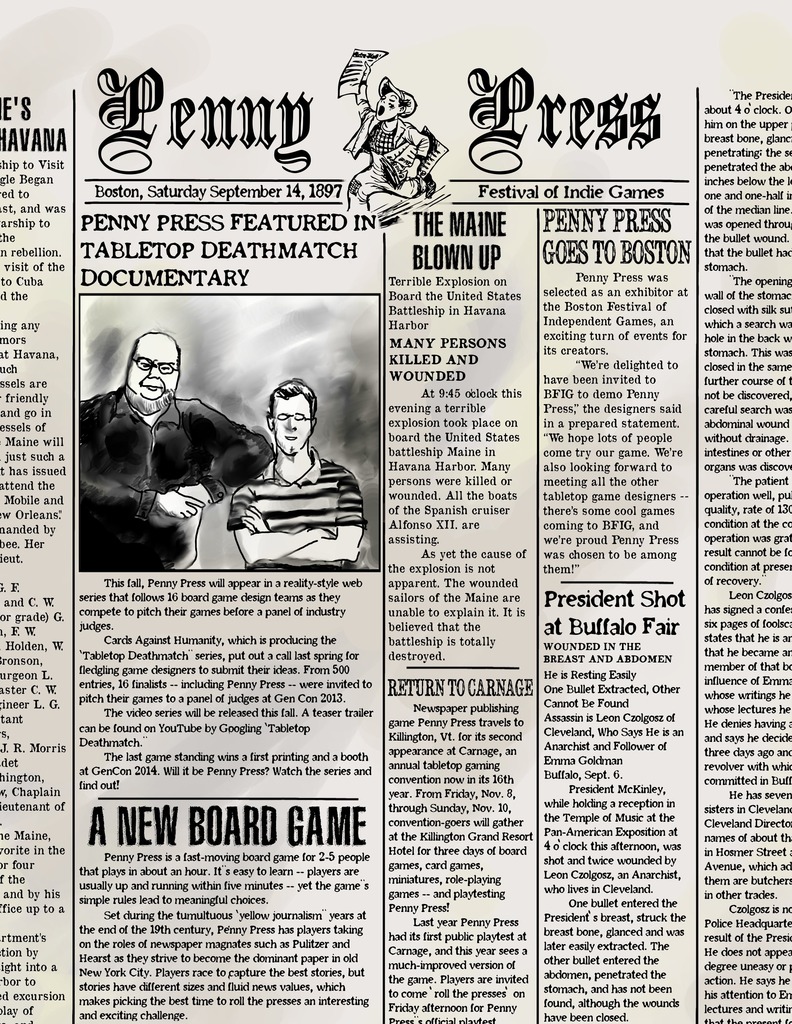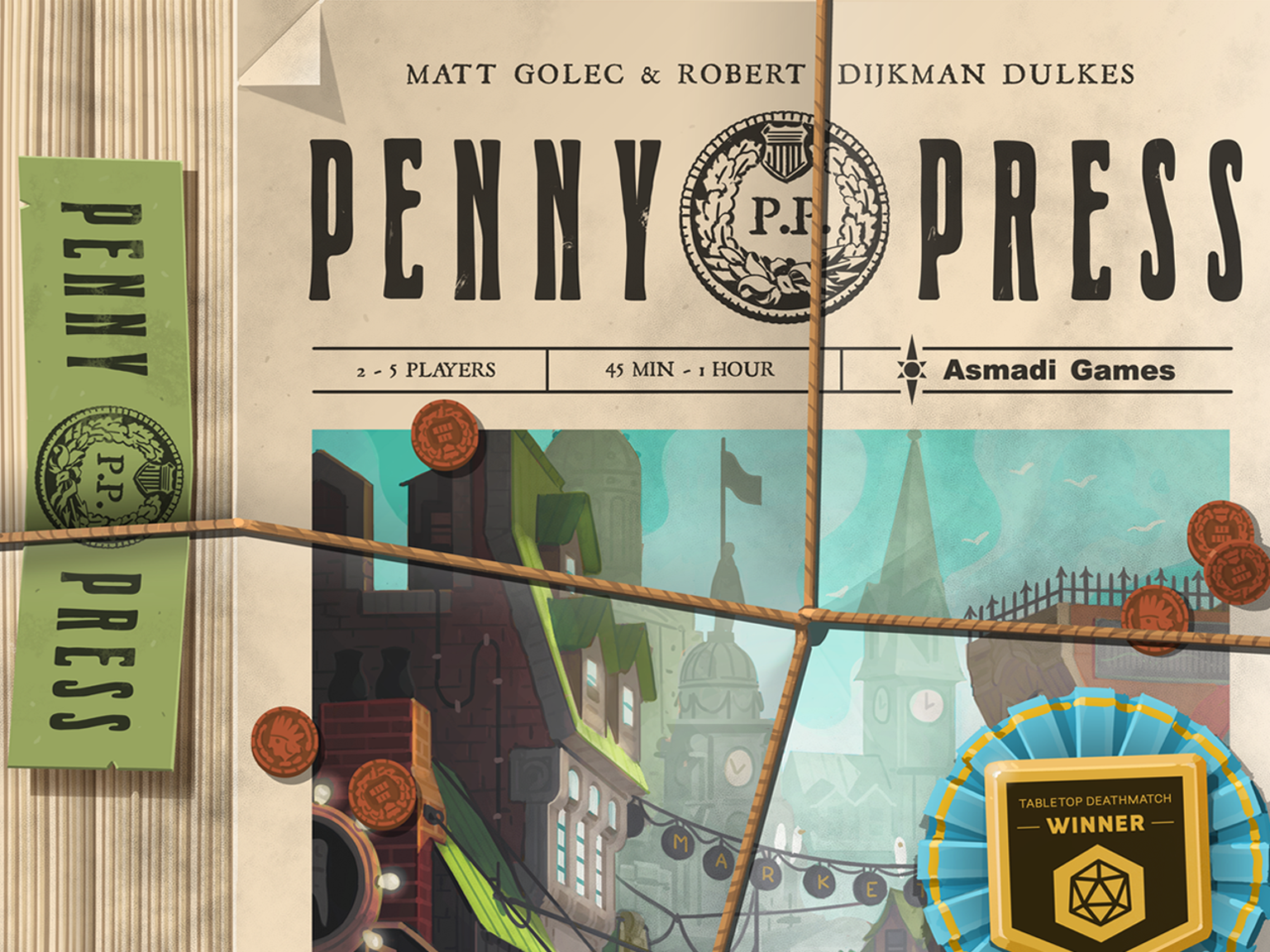As part of our April Spotlight on Penny Press, we strive to inform readers of little extra tidbits surrounding the game. Games are made by people, and one of those tidbits we enjoy is learning a little bit more about the people behind them. Some designers shy away from the public stage, while others enjoy being front and center. In the case of Penny Press designers Matt Golec and Robert Dijkman Dulkes, they’re willing to put their story out there any way they can if it’ll help drum up the news beats on this game. How fitting, really.
Penny Press celebrates the bygone era of 19th century yellow journalism amongst rival New York newspapers. The world was rapidly changing, and the competition for the gathering and spreading of the news of the day in the growing metropolis was fierce. In Penny Press, you are one of those newspapers. Your task is to send out your reporters in a specialized worker placement style to gather up the news stories happening at that time and then try to be the first to get those headlines to print.
So stoke up the presses and round up the paper boys, because we’re about to dive back into an era of history when people remembered The Maine, the McKinley assassination, and a time when Brooklyn wasn’t officially part of New York City. In this game, the world was approaching a new century, and it’s your job to get that constant flow of new information to the public in the most objective manner possible.
Just kidding; it’s your job to sell the most newspapers!
Since Pulitzer and Hearst are a bit busy these days in retirement, we sit down with the two intrepid Penny Press designers instead as we chat about their own newsworthy story of a game who has generated headlines before it’s even reached consumer’s hands. Enjoy!
Round One Questions
CR: What was your Gateway Game?
Matt: I played a bunch of games as a kid: Civilization, Star Fleet Battles, Car Wars, plus the usual mass-market titles, but Dungeons & Dragons was the game that changed my whole concept of what a game could be. I took a break from gaming from college through my 20’s, then came back after the Catan / Euro renaissance, but those early D&D games – played with nothing more than paper, pencils and a couple six-sided dice – were how I got pointed down this path.
Robert: Like Matt, I played Dungeons & Dragons for a long time, but it was probably Catan that really brought me over to board gaming as a major hobby.
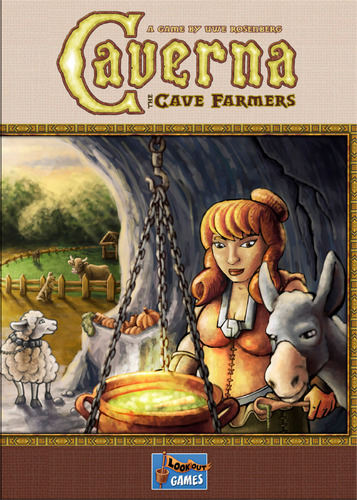 CR: What was the last game you really enjoyed playing (besides Penny Press)?
CR: What was the last game you really enjoyed playing (besides Penny Press)?
Robert: Terra Mystica and Concordia have really done it for me lately. Xia and Caverna and Enigma were awesome, too, and Red7 is a blast! Plus, we just finished a two-year Descent campaign that rocked.
Matt: Yeah, I really enjoyed our Descent campaign. Another recent game I like a lot is Vikings. It’s got a cool bidding wheel combined with meeple-placement and a Carcassonne-like tile puzzle. Great fun!
CR: How big is your game collection?
Matt: I’ve made a semi-conscious effort to limit my collection to about 100 games. There’s space considerations, of course, but there’s also just so many games I can keep in my head. If a game doesn’t totally grab me, or if I know I’m not going to play it, I’m happy shuffling it off to someone who’ll get more enjoyment out of it.
Robert: Somewhere between 300 and 400 games, I think. I’m a collector as well as a gamer. No limits, Matt!
CR: What is your favorite type of game to play?
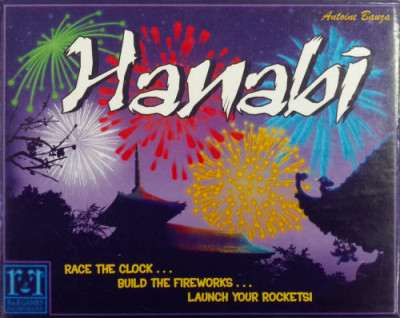 Robert: I like a clever Euro with lots of theme – like Penny Press! But I have a broad taste and like many different types of board and card games. As long as it’s fun, really.
Robert: I like a clever Euro with lots of theme – like Penny Press! But I have a broad taste and like many different types of board and card games. As long as it’s fun, really.
Matt: Robert’s absolutely right, fun rules. I generally like thematic games like Descent, and there’s no shortage of great Euros, such as Vikings. If pressed, I might say I’m not into abstracts and war games, but then again I really dig Hanabi and Command and Colors: Ancients. I do appreciate how games today are really blurring the boundaries among genres, so you might find a thematic Euro on the game shelf, sitting right next to a war-dexterity game.
CR: How do you feel about Monopoly?
Matt: My son got into Monopoly a few years back, so I’ve played it somewhat recently. It’s not that bad, especially with the correct bidding / trading rules, but it’s still too long for a Roll And Move game. Robert, did Dutch kids play this growing up?
Robert: The status of Monopoly in the Netherlands is pretty much the same as it is over here, and I owned a copy as a kid. It really isn’t as awful as people make it out to be, but these day it also really isn’t my thing anymore.
On Penny Press
CR: Penny Press offers a theme very unlike most other games. You’ve talked about the inspiration behind it previously here and on places like the Tabletop Deathmatch episode, but how was the reception to the game while testing it?
Matt: I think that’s been a big draw. Newspapers in 19th century New York – what’s not to like??
Seriously, as I like to tell anyone who’ll listen, the ‘Penny Press’ era was a time of great change in New York and America. I think people like exploring that era, and I also think they enjoy the mechanics of sending reporters out to grab stories and arrange them on their newspaper front.
Robert: Yeah, the reactions are pretty great, actually. Most people we play with really seem to take to it, so either they like it or don’t want to hurt our feelings!
CR: When we saw the game at Boston FIG, you just found out that you were co-winner of Tabletop Deathmatch. What was that like: getting the news you won and then showing it off at a convention but couldn’t say anything.
Robert: It took almost a year before they revealed the winner of Tabletop Deathmatch. We couldn’t tell anyone, not even our co-contestants, and that was awful. This year they changed things around and all contestants know who won, which is a lot better.
Matt: It was definitely no fun. We had such good news we desperately wanted to share with everybody, but we had to keep it to ourselves. It made for some tricky conversations with fellow Deathmatch finalists.
CR: Do you think there are any parallels between designing and producing Penny Press now and the efforts of the newspaper wars during the time of the game’s setting? If yes, how so?
Robert: Nah.
Matt: Well, in the Penny Press era, dozens of newspapers competed against each other for readers. Today, there may not be nearly as many newspapers, but we’ve got tons of great games competing for everyone’s attention and shelf space. So we knew we had to really go the extra mile in making Penny Press the best it could be so it would stand out in a crowded, competitive field.
Robert: Okay, what he said.
CR: The game actually uses real news events from the time period. What is your favorite particular news story included in the game?
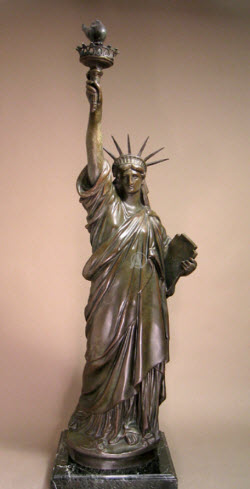 Robert: When you get right down to it, all stories that are currently in the game are our favorites, because we trimmed down from a much larger selection to just 45. I really like that many stories that survived the cut have some sort of relevance on today’s world.
Robert: When you get right down to it, all stories that are currently in the game are our favorites, because we trimmed down from a much larger selection to just 45. I really like that many stories that survived the cut have some sort of relevance on today’s world.
Matt: There were lots of quirky events, such as the Statue of Liberty turning green and the great horse manure crisis, but also more serious ones that touched on racial discrimination, women’s rights and immigration. I guess my choice would be the passage of the Tenement Act of 1901, which forced builders to include proper windows and indoor toilets (among other measures) in new construction.
CR: What was your favorite Penny Press moment in action seen thus far?
Matt: I loved seeing Penny Press being played in the wild at PAX East. Robert and I demoed Penny Press on Saturday, but lots of other folks checked out a copy from the tabletop library.
Robert: I just like it when the game clicks for people, usually when they go to press for the first time. There’s that ‘ah-ha’ moment as they start to really understand some of the game’s nuances.
CR: Of the game’s lifespan thus far, what would you say is the hardest lesson you had to learn about getting it made?
Robert: Do not promise early delivery on your Kickstarter as a stretch goal! Production always takes longer than you think it will.
Matt: Rules. Writing a clear set of rules that doesn’t sound like a legal document was surprisingly hard.
CR: Penny Press had a very well received Kickstarter, though. Were you at all surprised at all with how well it managed?
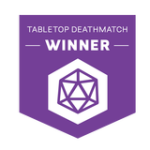 Matt: I didn’t have any real idea how far Penny Press would go, and as the pessimist half of our design duo, I was secretly hoping we’d hit $30,000 by the end of the Kickstarter. That it went more than twice that was just crazy and humbling. Some of the credit has to go to our publisher, Chris Cieslik of Asmadi Games, who ran a great campaign (and is an all-around good guy).
Matt: I didn’t have any real idea how far Penny Press would go, and as the pessimist half of our design duo, I was secretly hoping we’d hit $30,000 by the end of the Kickstarter. That it went more than twice that was just crazy and humbling. Some of the credit has to go to our publisher, Chris Cieslik of Asmadi Games, who ran a great campaign (and is an all-around good guy).
Robert: Yeah, Chris has been awesome! As for the Kickstarter, we were very happy when we hit $20,000. Then we hit $40,000, and we were super happy. Then $50,000 and we had to come up with new stretch goals – who knew it would go that high!
CR: Lastly, when was the last time you actually bought a physical newspaper on your own? Be honest.
Robert: Newspapers? Nah, I’m an iPad guy!
Matt: I’ve been a daily newspaper reader pretty much all my life. I subscribe to our fine local paper, the Valley News, and I love to check out newspapers wherever I travel. I know physical newspapers aren’t going to last; online delivery makes too much sense. But the newspapers of the last 125 years have played important roles keeping watch over government and big business, binding together our culture, and helping readers understand how people who are different from them live their lives. I sincerely hope those things don’t get lost in the digital translation.
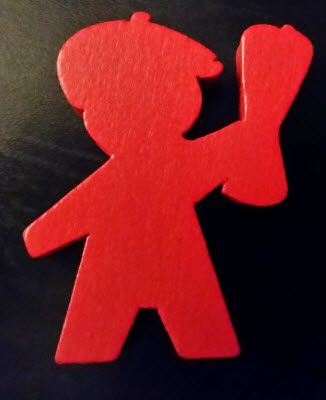
We’re off to the presses!
Newspapers themselves may seem a little archaic by many today as a means of disseminating important information, but for centuries they carried an important role in society. They entertained, informed, enlightened, and riled up countless thousands on everything from regime-ending political corruption to why an overweight cat hates Mondays. Newspapers embodied a cultural touchstone, and although a growing percentage consider their days in paper form largely numbered, it doesn’t make their content any less worthwhile.
Plus, their purposes lives on! In fact, the spread of information has never been more accessible or instantaneous. Like the game of Penny Press itself, we feel that we should celebrate that fact. So we’ve decided to give away a copy of the game.
Now, since Penny Press is all about competing for news, it’s only fitting that we make you use our modern information networks to spread this important gaming information. We’re sort of capitalistic like that.
Come help out The West Meepleville Gazette
Photo Credits: Penny Press cover and artwork by Asmadi Games; Caverna by Mayfair Games; Hanabi by R&R Games; Statue of Liberty by Wikimedia.

